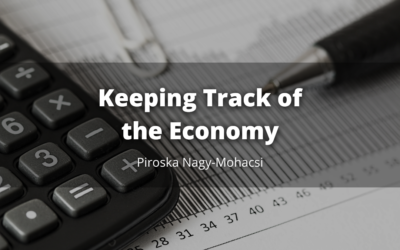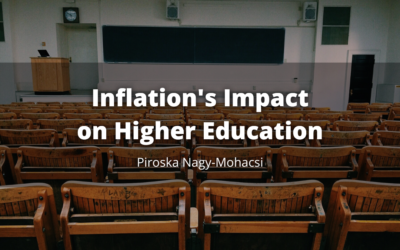About Piroska Nagy-Mohacsi
Piroska Nagy-Mohacsi is a multitalented professional skilled in academia, macroeconomics, and monetary policy operating internationally out of London, U.K., and Washington, D.C., USA. Throughout her career, she has established herself as a senior expert when it comes to creating global networks and leading regional and global research.
For nearly six years, Piroska has been working with the London School of Economics and Political Science’s Firoz Lalji Institute. She served as Programme Director for the Institute of Global Affairs for nearly six years, as Interim Director for almost a year, and since June, she has been operating as a Visiting Professor for the School. Previously, she has worked with the European Bank for Reconstruction and Development (EBRD), the International Monetary Fund (IMF), Fitch Ratings, Hebrew University of Jerusalem, and the National Bank of Hungary.
Piroska Nagy-Mohacsi is a skilled researcher whose work has been published multiple times. Her subjects of expertise and authorship include monetary policy, policy mix, financial resilience, and innovation – she is particularly interested in areas that include the regulation of digital currencies, central bank digital currencies (CBDCs), emerging economies, and developing countries. Notably, Piroska is the author of The Meltdown of the Russian State, which is widely considered to be a major account of the collapse of the Soviet Union and the subsequent slow rebirth of Russia during the 1990s. She also co-created the Vienna Initiative, a public-private platform operating in the E.U. and emerging Europe and providing regulatory coordination and cross-border financial sector crisis management enterprise.
In her career, Piroska Nagy-Mohacsi is motivated by innovation; she thrives in an environment of creativity, where out-of-the-box thinking is used to solve big challenges in the best interest of key stakeholders. Piroska is an Academic Partner with the Macroeconomic Advisory Group (MAG) in New York who also offers student and diversity mentoring at the workplaces for LSE, EBRD, and IMF. Alongside her experience, she is also a member of the editorial board of the “Finance and Development” journal as well as the BIS Committee on Remittances, where she also co-authored the Committee’s report.
Piroska Nagy-Mohacsi holds her Master of Science degree in Macroeconomics and Finance from Corvinus University of Budapest, Hungary. A few years later, she returned to academia when she enrolled at George Washington University in Washington, D.C., where she completed her postgraduate studies while majoring in Public Finance. Piroska has also been included as a panelist of speaker for a variety of events, including the “Planning for the Post-COVID world: central bank policies in emerging economies” event, which took place in October 2021. Most recently, she was one of the leaders to sign a letter to the G20 leaders regarding the inequitable distribution of the COVID-19 vaccine.
A polyglot, Piroska is a native Hungarian speaker who is fluent in English, Russian, and French and proficient in Spanish.
Piroska Nagy-Mohacsi’s Experience
London School of Economics and Political Science (LSE)
September 2015 – Present
Visiting Professor at the LSE Firoz Lalji Institute for Africa (FLIA) since June 2021, conducting policy-focused research on macroeconomic policy; the policy mix; and financial stability and governance.
Interim Director with managerial and academic leadership responsibilities at the LSE Institute Global Affairs (IGA) and its Programme Director (2015-February 2021), responsible for launching and managing major global research and policy initiatives: the Maryam Forum on transformational leadership, leading its activities at the LSE; the Rethinking Global Finance project that investigates factors of financial resilience and optimal regulation, including private and central bank digital currencies; the Global Migration project that engages the ALUM network of twenty lead universities across Europe for policy-focused migration research. Also co-led the LSE’s Global Policy Lab that advised on the content and implementation of transformational economic research and policy advice, with specialization in financial sector systemic risk and regulatory systems and monetary and exchange rate policy reforms.
European Bank for Reconstruction and Development (EBRD)
August 2008 – July 2015
Director for Country Strategy and Policy at the Office of the Chief Economist Responsible for the economic strategic directions in the EBRD’s 35 countries of operation in Europe, Central Asia, and North Africa as well as key policy initiatives (local capital market development, food security, climate change, and healthcare). Member of the EBRD’s Strategy Policy Committee. Responsible for the EBRD’s quarterly economic forecast exercise. Co-founder and Head of the Secretariat of the Vienna Initiative in 2009-15, a public-private coordination platform that is accredited to help avoid a regional banking sector meltdown in Emerging Europe in the context of the Global Financial Crisis 2008/9 and subsequently has supported financial sector reform.
International Monetary Fund (IMF)
1986-2008
Division Chief and Advisor Main responsibilities in the European, Fiscal Affairs and the African departments; leading advanced country surveillance and IMF program missions including debt restructuring negotiations (Paris Club and HIPC operations), as well as regional projects and research (trade, banking sector development, common currency zone, and capacity building). Key country responsibilities included France, Belgium, and G7 policy coordination, as well as Russia, Kazakhstan, Ghana, Senegal, Chad, Nepal. Contributed to IMF’s policy discussions and Executive Board and policy papers. Designed and led the establishment of the IMF’s regional technical assistance centers (AFRITACS) in Africa in 2001-03.
Books
Emerging Europe’s Chronic Distrust: Lessons From The Region’s COVID Puzzle, (2022), Corvinus University Of Budapest
A Yearbook on the Euro 2022, (2022)
New Policy Paradigm for the Post-COVID World, London School of Economics and Political Science (February 2021) (editor & co-author of e-book)
Financial Resilience and Systemic Risk, London School of Economics and Political Science (November 2019) (co-editor of video-book)
Ten Years of the Vienna Initiative: Reflections on Multi-country and Multi-player Issues, (co-author), (EIB, December 2019)
Building the Financial Foundations of the Euro Experiences and Challenges, (2008), Routledge (co-author)
Enlarging the Euro Area: External Empowerment and Domestic Transformation in East-Central Europe (2006), Oxford University Press (co-author)
The Meltdown of the Russian State (2000), published by Edgar Elgar, UK
Trade and Trade Policies in Eastern and Southern Africa (2000), IMF Occasional Paper 196, 1999 (co-authored)
Articles & Research
Managing the Megacrisis of 2022, Project Syndicate, July 2022
The Quiet Revolution of Emerging-Market Monetary Policy, Project Syndicate, August 2020
The Fatal Flaw of Central Europe’s Illiberal Democracies, Project Syndicate, January 2019
Cryptocurrencies Challenge the Status Quo, VoxEU, March 2018
Populism and Time Inconsistency, VoxEU, November 2017
Structural Reforms and Productivity Growth in Emerging Europe and Central Asia, LSE Research Paper Series, 02/2017, February 2017
Venceremos! Cuba’s lessons from Eastern Europe, Financial Times, December. 30, 2014
Addressing Private Sector Currency Mismatches in Emerging Europe, 2010 EBRD Working Paper, EBRD, London
The Fiscal Component and the First Russian Stabilisation Effort 1992-3, in Fiscal Policy and Economic Reform (1997), Routledge
The non-performing loan ‘tsunami’ that never happened (and how to stop it happening now), in LSE COVID-19 Blog (2022)
The COVID Non-Performing Loan ’Tsunami’ that Never Happened and How to Avoid it Now, in SUERF, 2022
The New Crisis Of Central Banking, in Project Syndicate, February 2022
Education
M.Sc., Macroeconomics and Finance, Corvinus University of Budapest, Hungary, 1981
Post-graduate studies at George Washington University, USA, 1989-90, major in public finance
Languages
English, French, Russian, Spanish (basic), Hungarian (mother tongue)
Recent Blogs
Keeping Track of the Economy
Tracking the economy might seem overwhelming, but there are simple tools to help you. Understanding how the economy works can improve the way you invest. Economic cycles repeat, and the data necessary to assess these phases is at your disposal. Interest rates,...
Recovering from a Financial Setback
A financial setback can happen to you without much warning, and you may not be prepared or have the resources to deal with it. This can leave you in a difficult position as you attempt to recover from the setback. Even when you lack the financial resources to recover...
Inflation’s Impact on Higher Education
The layoffs universities are making make the rise of inflation evident. However, it's not necessarily how much labor costs are leading colleges to cut back. In 2022, just about everything will cost more, and such rising prices are called inflation. Inflation is so...






